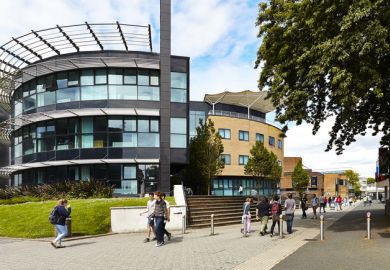The number of unconditional offers in the UK has fallen by more than a third, with analysis showing that just a handful of universities were responsible for about half of all those made last year.
Figures from the admissions service Ucas show that about 37,000 offers with an unconditional component were made in 2023 – 34 per cent less than in 2022, and 76 per cent below the peak year of 2020.
That year saw more than 156,000 offers with an unconditional component made, before controversial “conditional unconditional offers” were halted.
Many providers have handed out fewer offers with an unconditional component since then, although a few continue to do so in large volumes.
The University of Lincoln gave out 8,095 in 2023, 22 per cent of all unconditional offers that year – up from 6,950 the year before.
Together with the University of Hull (11 per cent), the University of Northampton (9 per cent) and Anglia Ruskin University (8 per cent), these institutions were responsible for half of the sector’s total.
Meanwhile, BIMM University gave out almost 2,000 unconditional offers last year – up from just five in 2022.
Three-quarters of offers nationally were “direct unconditional offers”, which are unconditional at the point of offer, and a quarter were “other unconditional offers” – conditional at the point of offer and becoming unconditional before the final date on which main scheme applications can be submitted.
A Lincoln spokesperson said the university has ended its Guaranteed Places Programme, reintroduced during the disruption of the Covid-19 pandemic, meaning far fewer unconditional offers are being made in 2024.
“We have introduced a new contextual offer scheme for 2024-25 entry, which we believe better reflects the particular challenges students from the communities we serve can face in aspiring to and entering higher education,” the spokesperson said.
Hull said a significant proportion of its unconditional offers were to applicants who declared contextual information in their Ucas application, while “other unconditional offers” were for applicants who had already met the entry requirements.
A Northampton spokesperson said its admissions process protected applicants’ interests and supported parity of opportunity, adding: “When administered responsibly – based on ability and evidence-based decision-making – unconditional offers can provide substantial benefits for both the applicant and the institution.”
Anglia Ruskin said its admissions process allowed students from backgrounds that typically have low participation in higher education to demonstrate their potential and achieve success.
“We make a range of offers, and these include unconditional offers to students meeting strict widening participation criteria and those applying for arts and performance subjects, where a portfolio of work and an interview is part of the admissions process,” said a spokesperson.
Just over a third of providers gave out any unconditional offers in 2023. These were most frequently made to students applying for a design, and creative and performing arts subject – which were responsible for 28 per cent of all offers in 2023.
“Conditional unconditional offers”, which were unconditional if the institution was selected as an applicant’s first choice, were banned by the Office for Students (OfS) during the coronavirus pandemic. A Fair Admissions Code of Practice published by Universities UK in 2022 said such offers should not be used in future, either.
John Blake, director for fair access and participation at the OfS, said it was up to individual universities to decide on their recruitment practices.
“Universities can place specific conditions on admissions to accommodate for the varying needs and backgrounds of prospective students. Any conditions placed on offers should align with the student’s interests,” he added.
A spokesperson for BIMM University, a specialist music and performing arts institution, said the institution places reliance on auditions, as well as academic grades, and unconditional offers are made where applicants can demonstrate high levels of performance skills.
“Unconditional offers are also made to mature students who have achieved the requisite Level 3 qualifications or where the institution gives recognition for prior industry practice,” they added.
Register to continue
Why register?
- Registration is free and only takes a moment
- Once registered, you can read 3 articles a month
- Sign up for our newsletter
Subscribe
Or subscribe for unlimited access to:
- Unlimited access to news, views, insights & reviews
- Digital editions
- Digital access to THE’s university and college rankings analysis
Already registered or a current subscriber?








